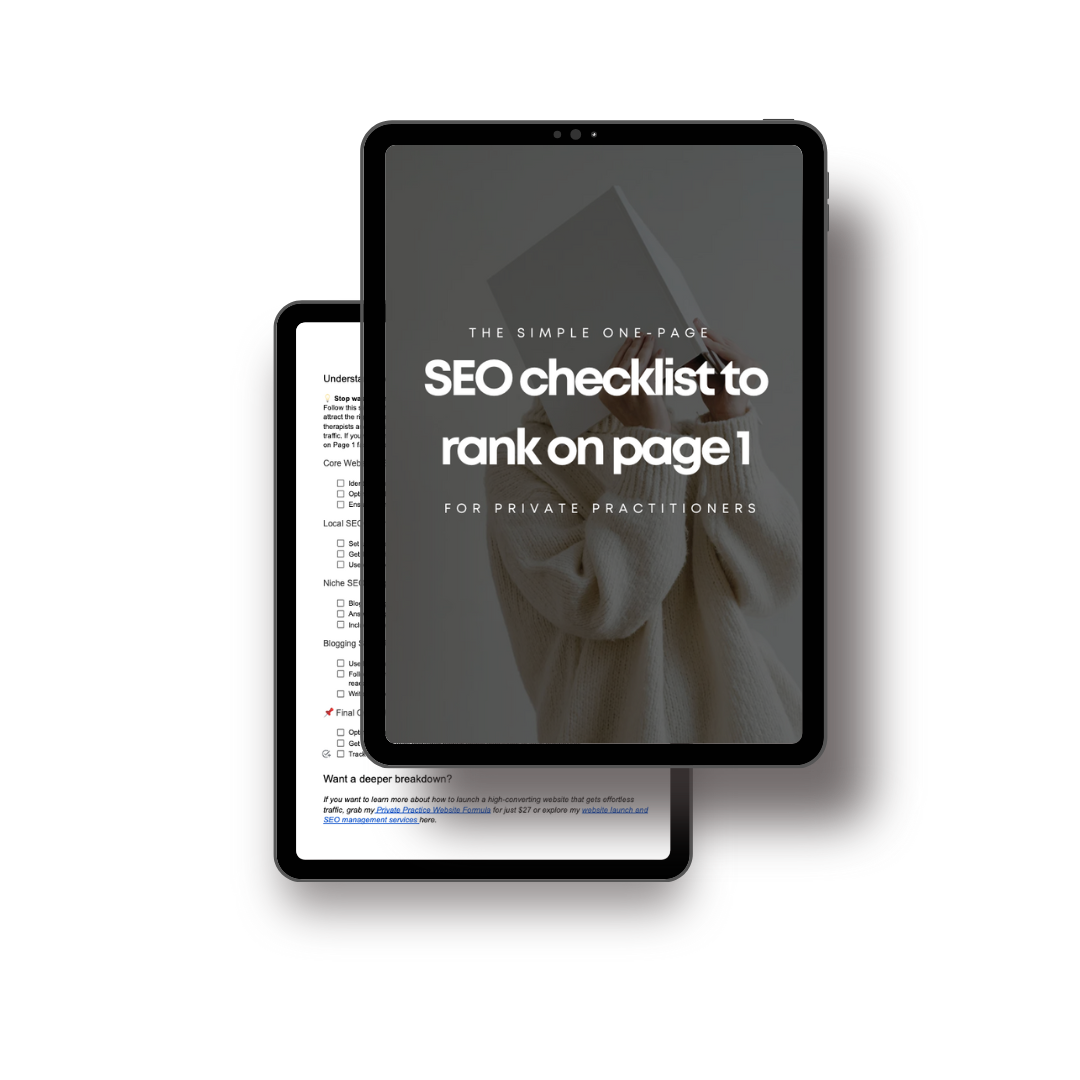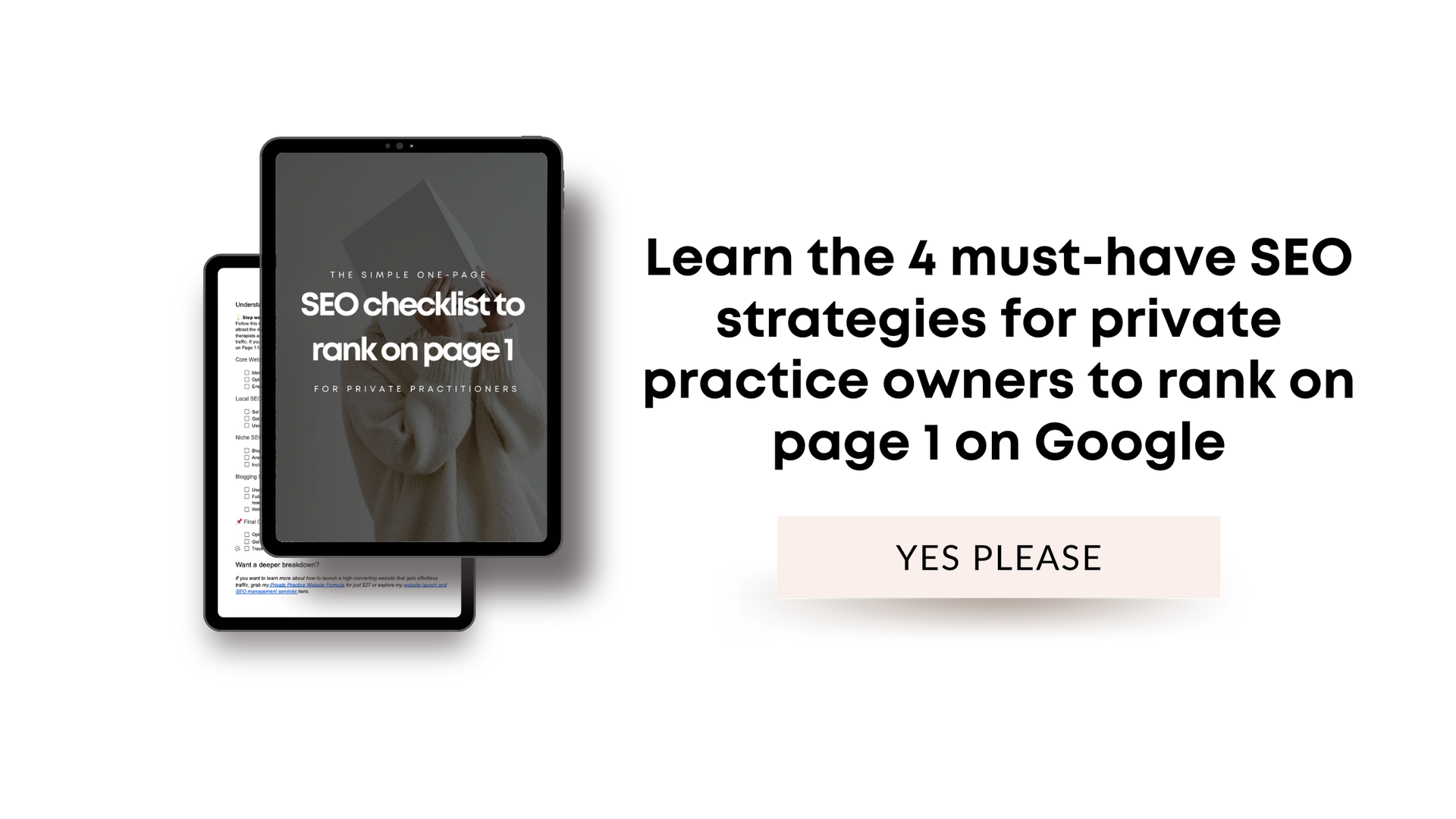Where to find the best writer for therapists and what to consider
Has it ever happened to you that a person in need of help hesitates before reaching out. They might have spent days—weeks, even—debating whether therapy is the right step. Late at night, after another exhausting day, they finally search online for a therapist. They’re hoping to find someone who understands, someone who speaks directly to what they’re feeling.
They land on a website. It should feel like relief. Instead, they’re met with a list of credentials, a generic "about me" section, and stiff clinical language that feels distant. Nothing in the words makes them feel seen. Nothing reassures them that this is the right place. So, they leave. Not because you’re not an incredible therapist, not because you can’t help them, but because the words didn’t bridge the gap between their fear and taking action.
This is why copywriting for therapists isn’t just marketing—it’s connection. The right words can make the difference between a potential client clicking away or taking that brave first step to book a session. If you’ve ever felt frustrated trying to explain what you do, or wondered why some therapy websites seem to attract clients with ease, this guide is for you.
In case we haven’t met yet—hi, I’m Natalia, a website designer for therapists and private practice owners. I help mental health professionals create high-converting, SEO-optimized websites that speak directly to their ideal clients while simplifying their marketing efforts. If you’re looking for a website that reflects your practice and brings in more inquiries, I can help.
Why copywriting for therapists is so important
Therapists spend years mastering the art of listening, guiding, and supporting their clients. Yet, when it comes to communicating their value online, many struggle to find the right words—ones that feel natural, engaging, and compelling enough to inspire potential clients to take action.
Your work revolves around communication—helping clients express emotions, process experiences, and gain clarity. But writing about your own practice can feel overwhelming. The reality is, your words shape how potential clients perceive you before they ever book a session. Without the right messaging, even the most experienced therapists can struggle to connect with their ideal audience.
Beyond website content, strong writing is essential for building credibility, nurturing client relationships, and growing your practice. From intake forms and welcome packets to blog content and social media posts, every word matters in shaping the client experience.
Therapy begins before the first session
Many therapists assume their qualifications and experience speak for themselves. And while credentials matter, the reality is that before a client ever books a session, they need to feel an emotional connection to you.
Think about it—when someone searches for a therapist, they’re not just looking for degrees. They’re looking for someone who "gets it."
A well-crafted website and strong copywriting:
- Create a sense of safety before they even step into your office.
- Reduce uncertainty by answering their biggest questions.
- Help them feel seen and understood, making it easier to take the next step.
Without clear, client-centered copy, even the most qualified therapists can struggle to attract clients.
What makes copywriting different for therapists?
Unlike traditional sales copy, writing for therapists isn’t about selling—it’s about building trust. The words on your website should create a sense of safety, connection, and understanding from the very first click.
How to improve your copy (even if writing isn’t your strength)
If hiring a copywriter isn’t in the budget right now, small tweaks can make a big impact.
1. Use empathetic language – Your potential clients may feel anxious, overwhelmed, or uncertain. Your words should feel warm and reassuring, not clinical or sales-driven.
- Instead of: “I provide CBT and EMDR for anxiety.”
- Try: “If anxiety is keeping you from living the life you want, I help clients find calm and confidence through CBT and EMDR.”
2. Write like you talk – Avoid complex jargon or overly formal language. Your website should feel approachable, not like a research paper.
- Too formal: “I utilize evidence-based techniques to support clients in managing stressors.”
- More natural: “We’ll work together using science-backed techniques to help you navigate stress and find relief.”
3. Include clear calls to action (CTAs) – Potential clients shouldn’t have to guess what to do next. Every page should gently guide them toward the next step:
- Schedule a free consultation – lowers hesitation and makes it easier to take action.
- Download a free mental health resource – builds trust while keeping them engaged.
- Join a newsletter for therapy insights – nurtures relationships until they’re ready to book.
Your words do more than describe your services—they shape the first impression of your practice.
Do therapists need copywriters? signs you should hire one
Therapists excel at guiding conversations, but writing about their own practice is a different challenge. If your website isn't attracting clients, the issue might not be your skills—it could be the messaging.
Here are key signs you might need a copywriter:
- Your practice doesn't stand out – If potential clients can’t immediately see what makes you unique, they may move on. A copywriter helps clarify your approach.
- Your website isn’t converting visitors into clients – A well-designed website isn’t enough; the words need to engage and encourage action.
- You don’t have time to create content – Between sessions, admin tasks, and running your practice, writing often takes a backseat. A copywriter ensures your website and marketing materials stay fresh.
- You struggle with ethical marketing – Therapists must balance professionalism with approachability. A skilled copywriter knows how to write in a way that feels both authentic and ethical.
Hiring a copywriter doesn’t mean losing your voice—it means amplifying it. With the right messaging, potential clients won’t just see your credentials; they’ll feel an immediate sense of trust and connection.
The cost of bad copywriting
Many therapists unknowingly lose thousands of dollars every year because their website copy isn’t doing its job. A website that doesn’t connect emotionally, educate clearly, or offer a next step will fail to convert visitors into paying clients.
Every visitor to your website is a potential client, but without the right messaging, they won’t take the next step. Your copy should do more than just describe your services—it should engage, reassure, and guide people toward booking a session. When your words don’t create a connection, your website becomes just another forgotten tab instead of a powerful tool for growing your practice.
Where to find the best writer for therapists
Writing your own website copy can be frustrating—many therapists feel stuck or unsure if their message resonates. If your website isn’t attracting the right clients, the issue may not be the design—it’s the words you use.
Specialized copywriters for mental health professionals
Therapy copywriting requires a deep understanding of psychology, ethics, and emotional engagement. Look for writers who:
- Have experience working with therapists, counselors, and wellness professionals.
- Understand therapy ethics and avoid misleading or overly sales-driven language.
- Know how to write SEO-optimized content to improve your search rankings.
Where to find them:
- Freelance platforms like Upwork, Fiverr, or Freelancer (search for “therapy copywriter” or “mental health writer”)
- Content agencies specializing in healthcare or wellness
- Referrals from other therapists in online groups or mastermind communities
What a professional copywriter can do for you
- Create high-converting website content tailored to your ideal clients
- Write SEO-optimized blog posts that position you as an expert
- Craft email sequences to nurture leads and encourage bookings
- Develop landing pages and lead magnets to build your client base
By investing in the right writer, you’re ensuring that your words work for you—helping your practice grow and connect with the clients who need you most.
Need someone to handle this for you? get ongoing copywriting and website support for your therapy practice
If you’re ready to elevate your online presence and let someone else handle your content, I offer a done-for-you monthly content package tailored for therapists.
For $197/month, you get:
- A website + tech stack
- Monthly blog posts and SEO updates (two blog posts or SEO pages per month, 24 SEO slots per year).
- Ongoing website copy updates to keep your messaging fresh and optimized.
- VIP support for content strategy, email marketing, and lead-generation content if needed.
Need a full website built? I also offer a complete website design and launch package for therapists who need a fully optimized website that works for them 24/7.
Why do copywriting services cost more than you expect?
- Specialized knowledge – mental health copywriters must understand therapy ethics, HIPAA compliance, and emotional nuance to craft content that is both compelling and ethical.
- Time-saving efficiency – instead of spending hours struggling to write, you can focus on seeing clients while your content works for you.
- Increased client conversions – a well-written website can attract hundreds of leads per month, turning casual visitors into paying clients.
Is it worth the cost?
Many therapists hesitate to invest in professional writing, assuming their skills and reputation should speak for themselves. But first impressions matter—strong copy can be the difference between a client reaching out or clicking away.
If a copywriter helps you bring in just five new clients, the investment pays for itself. More than an expense, quality copywriting is a strategy that allows you to focus on what you do best—helping people—while your words work for you.
Your words matter. The right copywriting can turn a passive website into a client-generating machine.
Your website is more than an online brochure—it’s the first step in a client’s decision to work with you. But without the right words, potential clients may scroll away instead of booking a session.
That’s where I come in. I build websites that not only look great but also convert visitors into clients. My website in a week package gives you everything you need to launch with confidence—fast.
What’s Included?
- A five-page custom website designed for conversions
- Automations for lead magnets, scheduling, and contact forms
- SEO boost – two blog posts or SEO pages per month
- Website branding (including a custom font if you don’t have a logo)
- Hosting & ongoing SEO management ($197/month)
Your website should sell your services for you—without the stress. Let me handle the strategy, design, and copywriting so you can focus on what matters most: your clients.
➡ Book your website project today and launch in just one week.

* AI Disclosure: This content may contain sections generated with AI with the purpose of providing you with condensed helpful and relevant content, however all personal opinions are 100% human made as well as the blog post structure, outline and key takeaways.
* Affiliate Disclosure: Some of the links on www.nataliamaganda.com may contain affiliate links meaning that I will get a commission for recommending products at no extra cost to you.

hello! i'm natalia
Latina, web design expert for mental health professionals.
I help ambitious life coaches, therapists and holistic leaders amplify their magic, gain visibility, and simplify their marketing efforts through strategic web design and content.










